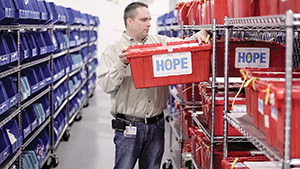
Dispensary of Hope's Director of Distribution Tim Lance handles a box of donated medicines in the organization's Nashville, Tenn., warehouse.
Leadership at Dispensary of Hope, a charitable medication distributor, says the organization has embarked on a five-year plan to expand the organization's reach and become a self-sustaining enterprise.
Dispensary of Hope, established in 2003, receives medication donations from drug manufacturers, distributors and physician practices into its Nashville, Tenn., warehouse and ships them to clinics and pharmacies in the U.S., where the medications can be given to those in need. Those clinics and pharmacies, known as medication access sites, pay a subscription fee that allows them to select and receive medications from Dispensary of Hope's inventory. Dispensary of Hope is the recipient of CHA's 2014 Achievement Citation, an award recognizing an outstanding program that exemplifies the ministry's mission to carry on Jesus' compassion and healing.
The organization's work allows for unused medication to reach those who don't have prescription drug coverage or who can't otherwise afford their medications. In fiscal year 2014, Dispensary of Hope received about $40 million in donated medication, but the organization said it was offered much more, about $1 billion worth of donated medication from manufacturers of generic medications. The organization doesn't have the capacity to receive, store and distribute at that volume, but it is working to expand its capacity.
The organization says about 52 million Americans live without access to essential medication.
Under its growth plan, first announced at the Clinton Global Initiative annual meeting in New York City this fall, Dispensary of Hope aims to manage over $100 million worth of donated medication annually. Dispensary of Hope's Chief Executive Chris Palombo said his organization is currently working to raise $5 million to carry out its plan from April 2015 to April 2020. The money will allow Dispensary of Hope to expand the medicines provided; strengthen sales and account management teams to recruit pharmacies into the dispensing network; broaden and formalize networks with generic medication manufacturers; expand a distribution center to accommodate the increase in donated medicine; and enhance its inventory system to increase operational efficiency, according to a written summary.
Dispensary of Hope formed as a service of Nashville-based Saint Thomas Health, which is part of St. Louis-based Ascension Health, and it plans to remain a wholly owned charitable subsidiary of Saint Thomas Health, Palombo said. Saint Thomas Health has pledged $1 million over five years to the expansion effort. The Mindset Social Innovation Foundation has pledged $500,000 in funding over the five years to support the Dispensary of Hope expansion work. The Mindset Social Innovation Foundation is a Canadian charity that focuses on solutions to complex social problems, including access to affordable medicine.
Dispensary of Hope is currently working with six leading drug manufacturers and two nationwide health systems, Ascension Health and Livonia, Mich.-based CHE Trinity Health, to increase the supply of essential medication to people who lack coverage for prescriptions. The plan calls for more long-term relationships with manufacturers to secure supply consistency. Dispensary of Hope wants to expand its inventory to the top 350 most needed medications. It now usually has about 250 of these medications consistently available, said Anita Stanford, Dispensary of Hope's chief development officer.
Currently, Dispensary of Hope works with about 60 dispensing sites. Palombo said Ascension Health and CHE Trinity plan to add 55 of their medication dispensing sites as subscribers in the next five years. The expansion plan calls for a total of 220 dispensing sites, including more hospital-based and community charitable pharmacies. Under the plan, subscription fees from those medication access sites paid to the Dispensary of Hope could allow the organization to be self-sustaining by 2020.
Palombo said it's exciting to be expanding a service that allows unused medications to be put into the hands of patients who need them. "By working together, everyone wins," he said.
Copyright © 2014 by the Catholic Health Association
of the United States
For reprint permission, contact Betty Crosby
or call (314) 253-3477.